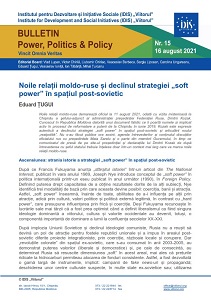New Moldo-Russian relations and the decline of the “soft power” strategy in the post-soviet area
New Moldo-Russian relations and the decline of the “soft power” strategy in the post-soviet area
Author(s): Eduard Ţugui
Subject(s): Environmental and Energy policy, Government/Political systems, International relations/trade, Security and defense, Military policy, Socio-Economic Research
Published by: IDIS VIITORUL Institutul pentru Dezoltare şi Initiative Sociale
Keywords: Moldavian-Russian relations; Soft power; socio-economic issues in relations with Russia; European
integration; road and energy infrastructure projects;
Summary/Abstract: The new Moldovan-Russian relations officially began on August 11, 2021, with the mysterious visit to Chisinau of the Deputy Head of the Administration of the Presidency of the Russian Federation, Dmitry Kozak. Known in the Republic of Moldova for a fateful document bearing his name and actively involved in the power reform process in Chisinau in June 2019, Kozak is the authentic expression of the decline of the “soft power” strategy in the post-Soviet space and the articulation of the new “realpolitik”. The time of his arrival, the agenda of the meetings and the content of the Russian official’s talks with President Maia Sandu and with some members of the Government were not made public, while the press release on the presidency’s website and Dmitry Kozak’s statements after the meeting with the head of state, must be interpreted only in a broader context that will mark the new Moldovan-Russian relations.
Series: BULLETIN Power, Politics & Policy
- Page Count: 4
- Publication Year: 2021
- Language: English
- Content File-PDF

